Report on the Event of “Meet the Ambassador: Japanese Ambassador"
14 November 2022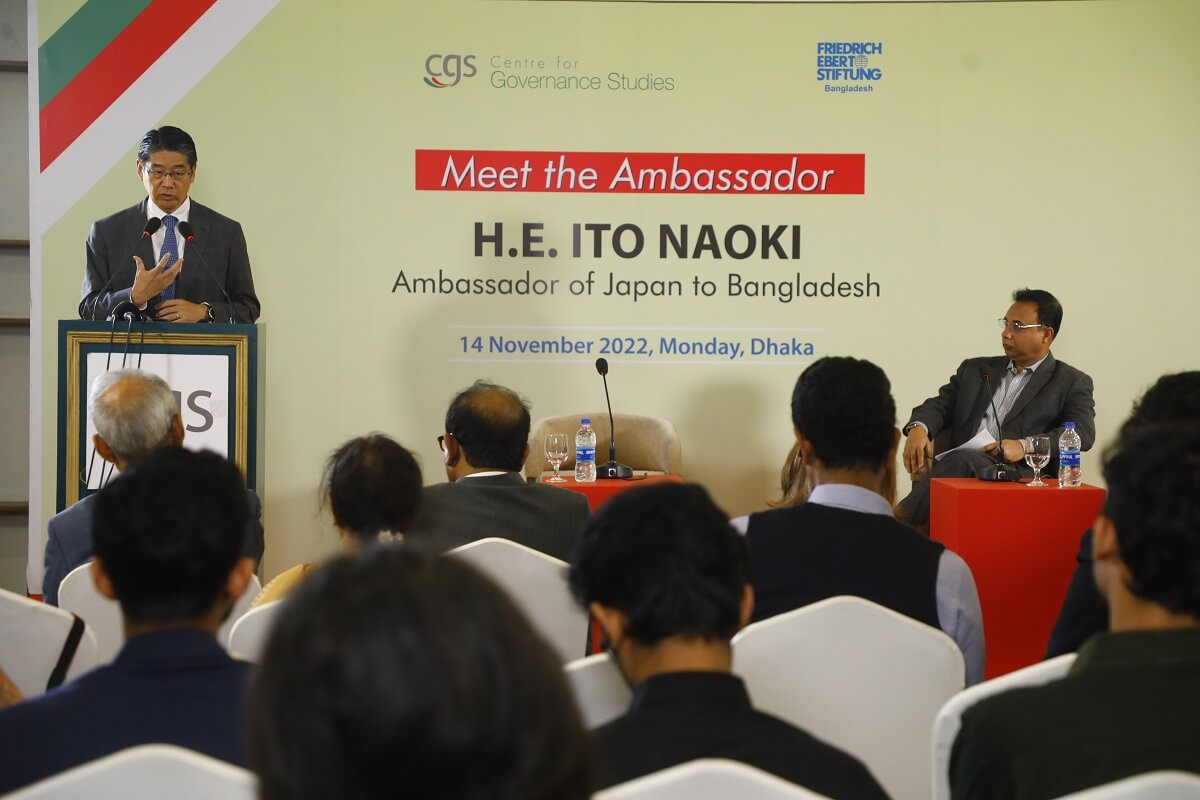
On Monday, 14th November a program was hosted by the Centre for Governance Studies (CGS) in collaboration with Friedrich-Ebert-Stiftung (FES) Bangladesh titled “Meet the Ambassador”. The event took place in a hotel in Dhaka and was the fourth edition of a series of “Meet the Ambassador '' programs. In these programs, ambassadors from various nations and international organizations are invited to talk to politicians from both ruling and opposition parties and members of Bangladesh’s businesses, civil society, academics, entrepreneurs, media and. H.E. Ito Naoki was the key speaker at the event, where he gave a keynote speech and then answered various questions regarding relations between Japan and Bangladesh.
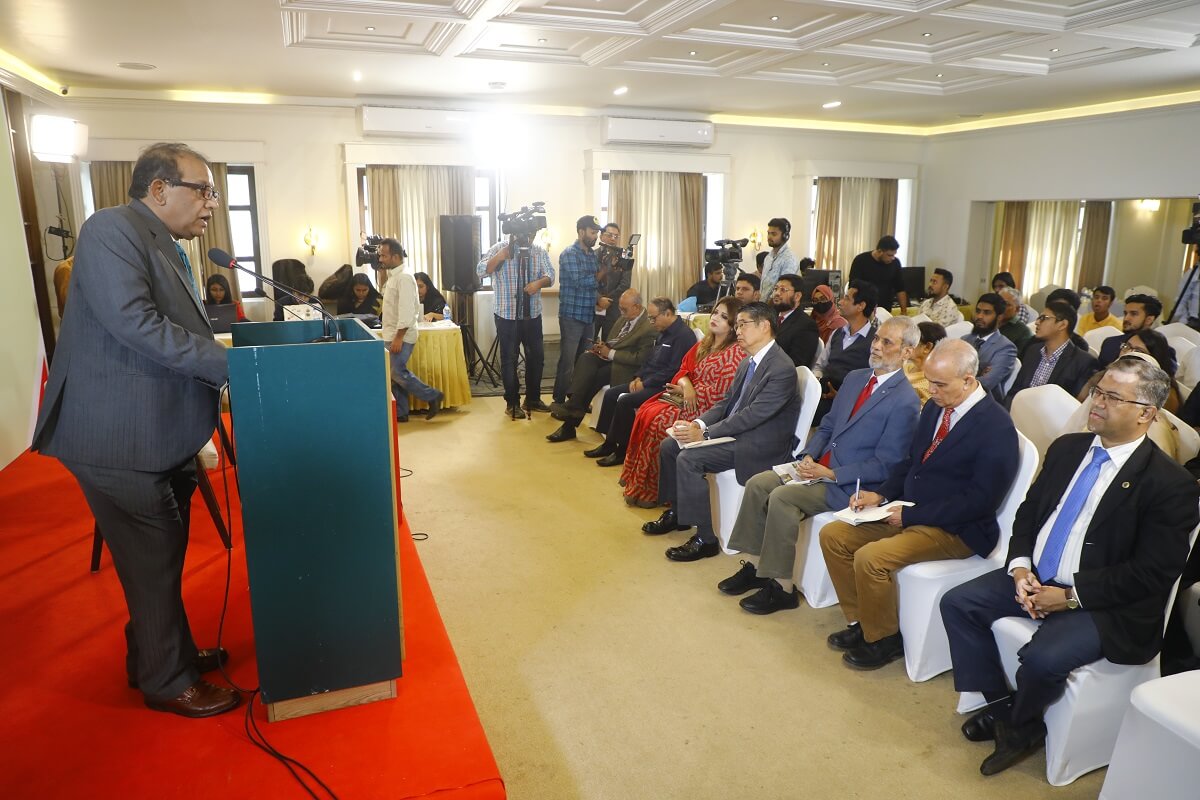
The discussion was kicked off with an opening speech from the Chairman of CGS and Chairman of the National River Protection Commission, Manjur A. Chowdhury, followed by an address by Program Coordinator of FES Bangladesh, Mr. Shadhan Kumar Das.
Manjur A. Chowdhury welcomed everyone on behalf of CGS. He stressed that Japan has been a trusted ally since the birth of Bangladesh. While being released from the captivity of Pakistan, we fought a brutal fight. Japan has helped us financially and diplomatically. Japan's help in these terrible times is forever appreciated. It has traditionally been the biggest contributor to the country. Japan and Bangladesh have spiritual and cultural ties in addition to economic relations. Rabindranath Tagore visited Japan four times and wrote about it in Japan Jatri. He added that the geopolitical situation in the region has changed. The world economy is now driven by Asia. Bangladesh is located between India and China, the two Asian giants. Emerging major powers are competing and strategic showdown are demonstrated in the Indo- Pacific. Japan proposed a development plan to turn the Belt region into an economic powerhouse. Work on these projects is underway. He concluded his speech by noting that in our darkest times, when we were involved in a brutal conflict, Japan and the Japanese people helped us. Japan suffered a nuclear disaster in 1948. After World War II, the Allies began a trial. This trial included the legal murder of Japanese generals. Forced dissent and stuck in justice and fairness. This is where our connection begins with fairness and justice.
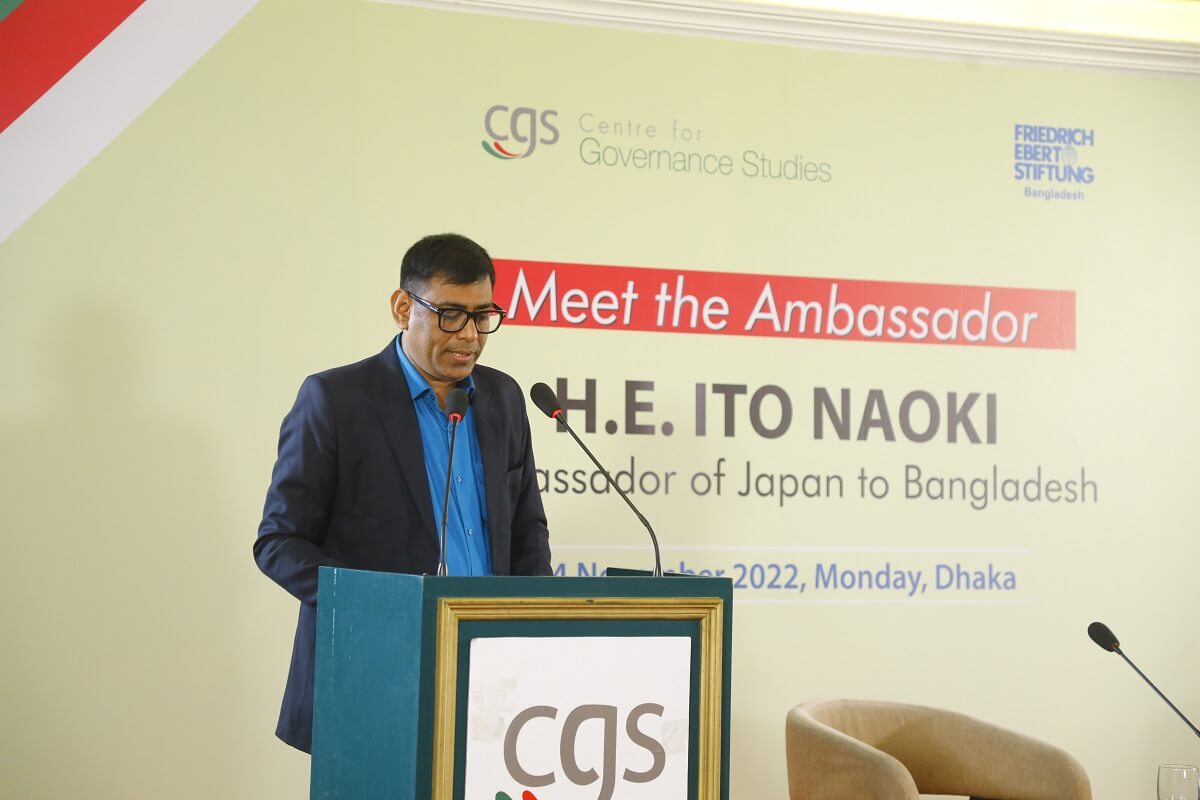
Shadhan Kumar Das gave his welcome speech on behalf of the Resident Representative of FES Bangladesh. In his speech, he talked about the nature of the work of FES Bangladesh. He said that Japan was the largest export destination for Bangladesh in the last decade. Bangladesh exported garments worth $1,184 million, including knit goods and leather, and imported iron and steel, ships, vehicles, nuclear reactors, machinery and mechanical appliances worth $2,001 million. Japan's total direct investment in 2021 is $91 million. He believed that this bilateral relationship between Japan and Bangladesh would be managed to build a stronger strategic partnership, which is an area that Bangladesh can explore further.
In his keynote address, Ito Naoki gave a brief overview of relations between Bangladesh and Japan. He first thanked the People of Bangladesh for their outstanding hospitality in this journey. He said while the bilateral relations are stable, more initiatives and efforts are needed to further strengthen this cooperation. He suggests a more cooperative relationship where both sides benefit, adding that they are always open to doing so.
He appreciated contemporary economic developments, especially impressive growth. He stressed that the nature of the partnership between the two countries needs to change. He mentioned some of the symbolic events that are going to take place between Bangladesh and Japan.
According to him, there are four aspects of cooperation between the two countries. He claimed that the first is the ongoing development relations, which were established during the visit of Bangabandhu Sheikh Mujibur Rahman. Japan is also ready to work with other countries to promote agriculture, he added. He hoped that Japan would accelerate the pace of development initiatives of Bangladesh in the coming years. He described the Matarbari project as one of the initiatives of game-changing. Japan is trying to meet the infrastructural requirements of Bangladesh through loans. He feels that since the younger generation constitutes the lion's share of the country's labor force, more attention needs to be paid to human resource development. Bangladesh needs more data software while graduating and we are also working on it.
Secondly, he talked about trade and investment between the two countries. "Bangladesh is Japan's second largest export market, but we want to be the first in this regard." We are currently working on how to strengthen the economic partnership for a new framework of trade and investment. Japan is also hoping to maintain the GSP facility for the free trade agreement. He sincerely hoped that Bangladesh would agree to reduce duties on various imported goods. He also talked about the Special Economic Zone at Araihazar, where Japan is helping to build the region with a corruption-free culture.
Thirdly, he mentioned that the Indo-Pacific region is free and open. "We are also willing to encourage Japan's contribution to improving the capabilities of law enforcement agencies," he said. Japan considers Bangladesh an important ally for a free and open Indo-Pacific region.
Finally, he discussed all-encompassing cooperation. In particular, he stressed the need for advancing bilateral cooperation in the field of operations and security. He mentioned the joint training session between the Japanese and Bangladeshi navies. He also said Japan is now preparing to supply defense-related equipment to Bangladesh. Whether it is for travel or education, he believes that the interpersonal communication between Japan and Bangladesh will be more.
After the speech of the Ambassador, the discussion session started, which were being moderated by the Executive Director of the Centre for Governance Studies (CGS), Mr. Zillur Rahman.
During the discussion with moderator Zillur Rahman, the ambassador hoped that the level of cooperation between Bangladesh and Japan would be greatly improved in the coming years. In his remarks, the ambassador claimed that despite the odds, Bangladesh will emerge as a nation whose economy is expanding at the fastest rate. He has support for the steps taken by Bangladesh to deal with the pandemic. He thinks that bilateral ties between Bangladesh and Japan, however, are more likely to strengthen.
According to him, Bangladesh is the ideal location for the Japanese ambassadors to carry out their responsibilities. While he was talking about the things he had accomplished during his time here, he said that his office had planned to arrange 50 events to mark Bangladesh becoming 50 years old, and that we are very near to fulfilling that goal.
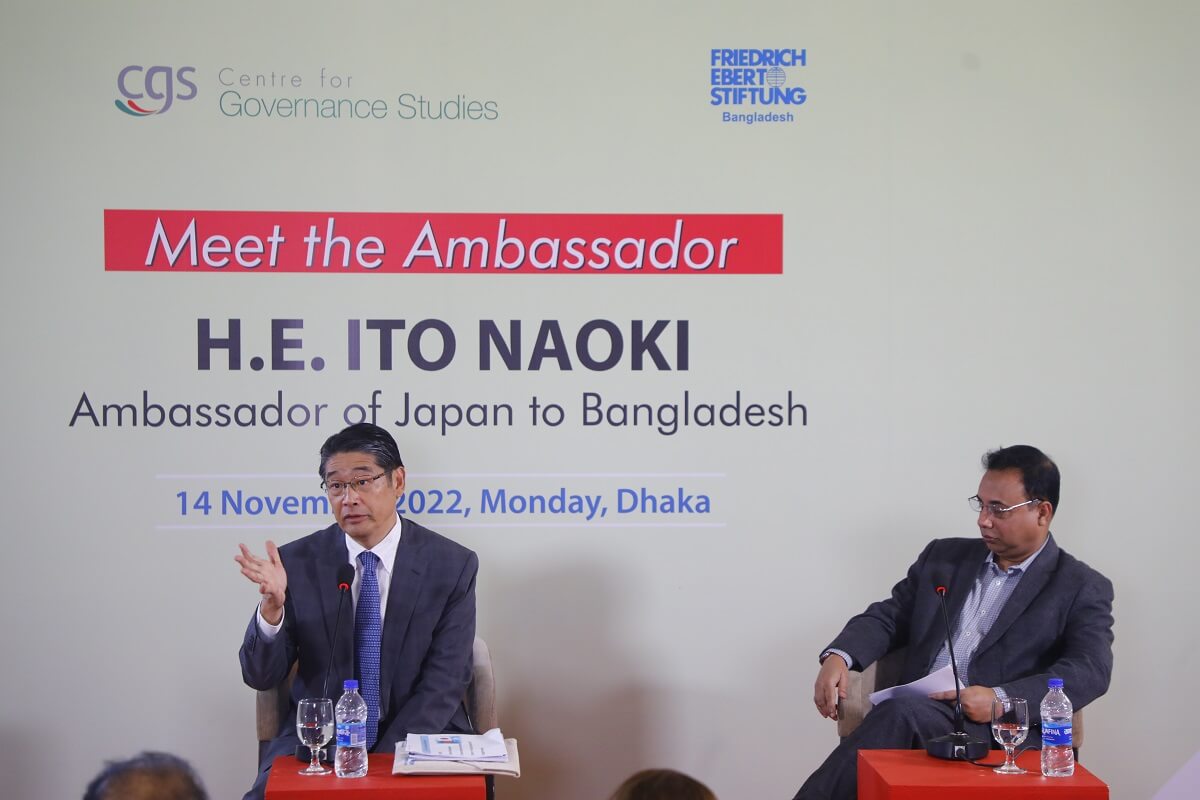
The ambassador mentioned it as very potential and important while discussing the signing of the possible Memorandum of Understanding as a precursor of the ‘Free Trade Agreement (FTA)’ during the upcoming visit of the Prime Minister of Bangladesh to Japan. He said, beyond graduation, a new framework of the Free Trade Agreement is needed to encourage private companies to participate in trade and increase investment and therefore they prefer Economic Partnership Agreement (EPA) wider than the free trade agreement. He emphasized reducing tariffs and reforming the structure of the trade sector. Customs clearance, tax reform issues, and remittance are some of the issues he thinks need to be reformed.
He appreciated Bangladesh for providing shelter to the Rohingyas and assured that Japan would always cooperate in the matter of Rohingya repatriation. He considered the Rohingya crisis a big challenge for the international community and also said that unless Myanmar's political situation improves, the repatriation process will be difficult. He also said that there is an opportunity for skill development among the refugees through taking the necessary measures. He urged that Rohingya camps require the participation of not only UN agencies and NGOs but also the private sector and every possible source.
The ambassador praised the culture of Bangladesh and expressed his deep compassion and love for it. He sang two lines of Rabi Tagore's 'Aguner Parashmani' and said that Tagore's music helped him heal from his tiring schedule.
The final part of the event was dedicated to the audience's question-and-answer session. In this final session, the audience of various dignitaries of the country questioned the ambassador on the bilateral relationship, challenges, and prospects of the two countries.
In response to the question about voter education and the fund of the Japanese government for it, the ambassador said that providing proper education to the voter regarding elections is very important and he hoped that the international community would come forward to do this. He also said that participating in the election is the political party's own decision, it should not affect the fund of the project of voter education or human resource education.
Regarding the diversification of Bangladesh's export industry and solutions for limited export products, Mr. Naoki advised Bangladesh to focus on specific sectors and provide budget resources for them. He suggested Bangladesh be more aware of the importance of competition in the market. He emphasized that Bangladesh needs to be more cooperative with the neighboring countries, particularly countries towards the east, and to be integrated into their supply chain. He mentioned that Bangladesh needs to be a part of the RCEP countries’ framework and made it clear that Japan finds China as only a member of it, not the leader.
The ambassador said that Japan lifted the restriction on exporting defense-related equipment and he confirmed that Japan can export the defense material to Bangladesh. But now they are seeking the possibilities of agreements between Bangladesh and Japan so that the Japanese company can export defense-related equipment. He stated that now they are focusing on the mobile radar system and mentioned a Japanese company’s contract with Philippine Air Force. He hoped that if Bangladesh and Japan can export, it will be a very different scenario between the two countries in terms of defense cooperation.
While talking about Matarbari, Mr. Naoki referred to it as an important project for the trade and economy of Bangladesh. He said the project might take longer, but it will undoubtedly help Bangladeshi people with economic enhancement. He added that it will open up real transportation opportunities for Bangladesh and it is going to be the regional Hub of Transportation Energy Hub and Industry Hub.
Regarding the discussion about reducing scholarships for medical students in Japan and the non-recognition of medical degrees from Japan in Bangladesh, Mr. Naoki found it unfortunate. He hoped the scholarship would be increased and the Government of Bangladesh would recognize the medical degrees from Japan. He expected that more Bangladeshi students will choose Japan as the destination for medical study, especially the clinical subjects. In addition, Mr. Naoki stated that Elderly Care is an important area and he claimed that more Bangladeshi young people can go to Japan as caregivers. He mentioned an MOU regarding Specified Skilled Workers (SSW) signed back in 2019 between Bangladesh and Japan where only one Bangladeshi went to Japan under this agreement.
At the end of the event, the ambassador again highlighted the strategic plan between Bangladesh and Japan. The ambassador stated that there are new elements of FDI that will aid in the development of a more sustainable strategic partnership. He claimed that Quad will not have any impact on the bilateral relationship. He was so hopeful that both countries would be able to elevate this partnership to a new height. The ambassador stated that they are happy and honored to be Bangladesh's largest development partner, but there are projects from a strategic standpoint. He added that the issue of a geopolitical call is solely dependent on the government of Bangladesh. He found the upcoming visit of Prime Minister Sheikh Hasina to Japan to be a new hope and prosperity.
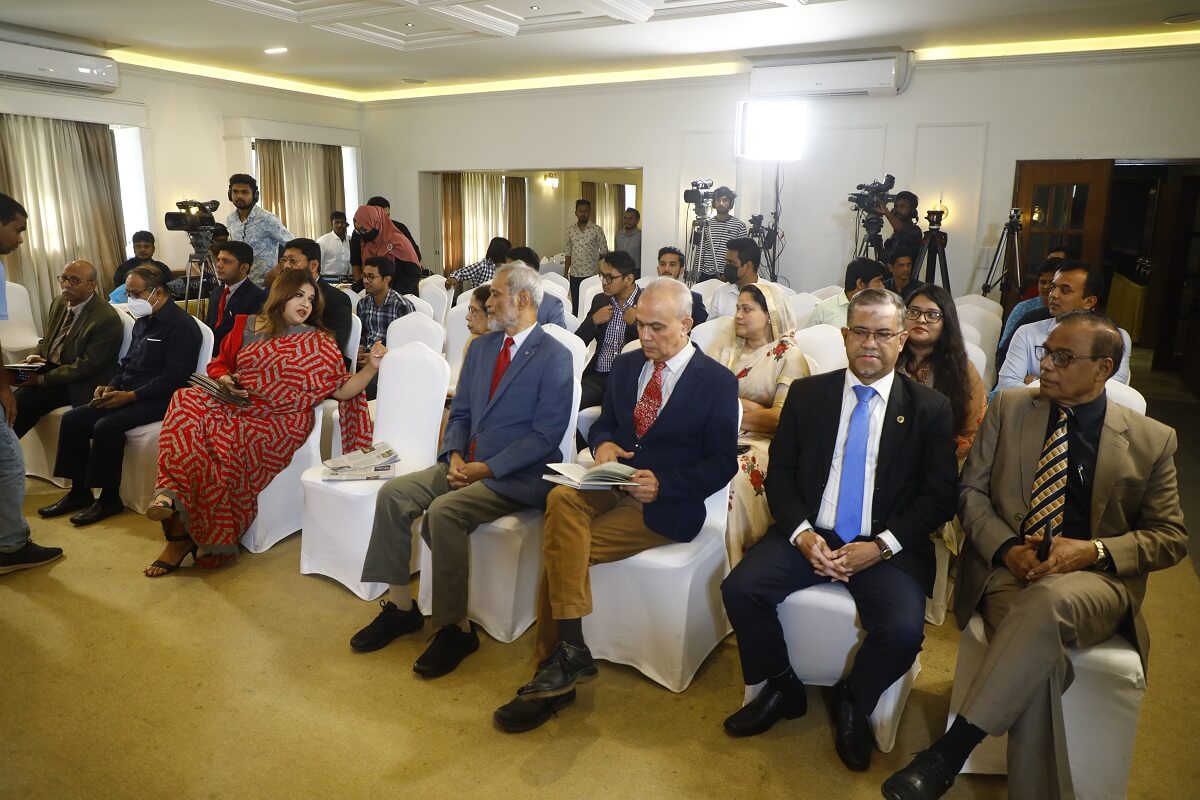
Some of the audience who participated in the questions and answer sessions are Dr Abdullah-Al-Mamun (Faculty Member, Japanese Studies, Dhaka University), M.A. Aziz (Senior Journalist), Faiyazul Haque Razu (Chairman, Sher- e- Bangla National Foundation), Maj. Gen. Syed M Ibrahim (Retd.), BP (Chairman, Bangladesh Kallyan Party), M Shafiullah (Former Ambassador), Shama Obaid (Organizing Secretary, BNP) etc.
